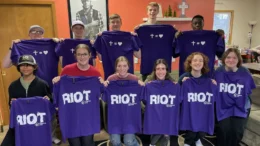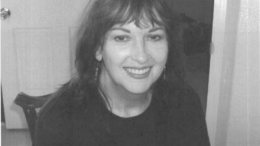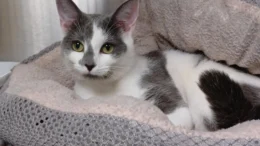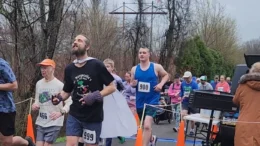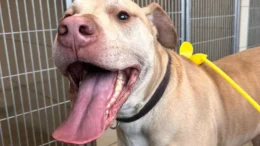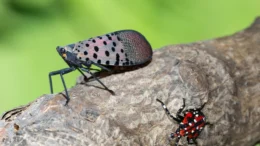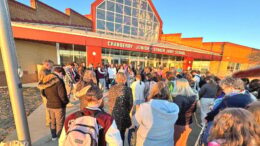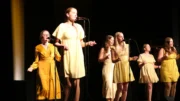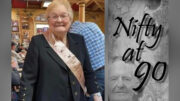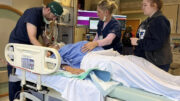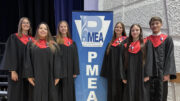SAN JUAN, Puerto Rico (AP) – A passionate advocate for making Puerto Rico the 51st U.S. state appears poised to become the next governor of the territory, giving a boost to a movement that has been gaining momentum amid the island’s economic woes.
Ricardo Rossello, a scientist and the son of a former governor of the island, is expected to win Tuesday largely due to widespread public anger over the decade-long recession and a corruption scandal that has left the party of his main opponent in disarray.
But Rossello intends to make joining the union the central focus of his administration if he takes office. “We’re going to fight for statehood,” he said.
The 37-year-old candidate, who has spent more than a quarter of his life on the U.S. mainland and flies an American flag outside his home near San Juan, sees statehood as the key to reviving an island that is such an economic basket case that Congress imposed a fiscal oversight board this year in exchange for helping the territory’s government dig out from $70 billion in public debt.
Puerto Ricans remain divided over whether to try to change their relationship to the U.S., and Congress appears lukewarm to the idea of adding two new senators and a handful of representatives from the island of 3.5 million people.
But Rossello is ready to fight for it. “We feel statehood or the lack thereof is one of the critical root problems in Puerto Rico,” he said.
He told The Associated Press that as governor he would draft a state constitution, hold elections to choose two senators and five representatives to Congress and send them to Washington to demand statehood, a strategy used by Tennessee to join the union in the 18th century.
“We reserve the right to use all means necessary so we can finally finish the 500-year debacle that has been colonialism,” he said.
Rossello seems likely to get the chance. An October poll by El Nuevo Dia, the largest newspaper on the island, said he led the six-candidate field with support from 40 percent of voters. David Bernier, who previously served as the equivalent of lieutenant governor for current Gov. Alejandro Garcia Padilla, trailed at No. 2 with 28 percent.
Garcia, who served a single term, is not running for re-election. He presided over a series of debt defaults that began in August 2015 and culminated with the deeply unpopular fiscal oversight board.
His chosen successor, Bernier, has been hampered by a scandal that has engulfed their Popular Democratic Party. Testifying in a federal corruption case, a former fundraiser for the party detailed extensive kickbacks on government contracts. That forced the speaker of the legislature, also a member of the party, to resign.
Puerto Rico’s fiercely competitive political scene revolves around the question of the island’s relationship to the U.S., referred to here as the “status” issue.
The New Progressive Party of Rossello supports statehood. The Popular Democratic Party opposes it, arguing that the island’s current status as a semi-autonomous territory allows Puerto Ricans the benefits of U.S. citizenship without having to give up Spanish as the dominant language or a larger sense of their cultural identity. A small minority favors independence.
Bernier has pledged to pursue more autonomy for Puerto Rico, acknowledging that the commonwealth status on which his party was founded is no longer viable. “The status problem is important and we’ll address it,” he told the AP.
Rossello, who graduated from MIT and has a doctorate in biomedical engineering from the University of Michigan, says statehood would ensure badly needed economic stability, attract investment and send property values soaring. “The fact that we don’t participate equally democratically or otherwise limits our capacity to progress,” he said.
In a 2012 two-part referendum, 54 percent of Puerto Rico voters said they wanted a change in status. In the second question, 61 percent said they favored statehood. But so many people left the second part blank that critics said the results weren’t reliable.
Annie Marrero, a 52-year-old school superintendent who plans to vote for Bernier, said she doesn’t reject statehood but doesn’t believe it’s an option.
“It’s more out of reach now than ever,” she said. “Statehood is a distant reality for an island that is broke.”
But Puerto Rico’s economic struggles, which have driven more than 200,000 people to the mainland in recent years, are encouraging a growing sense among some that closer ties to the mainland could only help.
“Puerto Rico has reached that point of meltdown for this to happen,” said Jose Gomez, a 19-year-old university student who plans to vote for Rossello.




